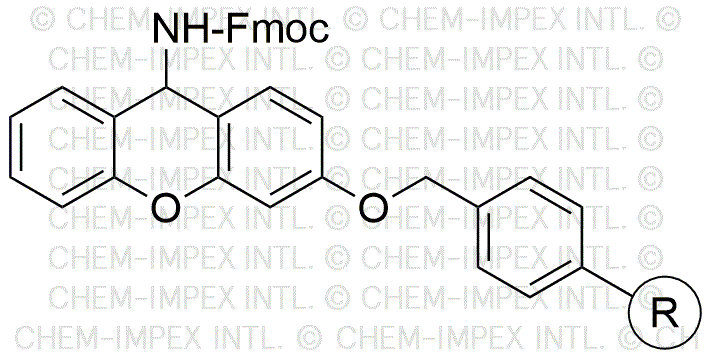9-Fmoc-aminoxanthen-3-yloxy-polystyrene resin is widely utilized in research focused on:
- Peptide Synthesis: This resin serves as a solid support in the synthesis of peptides through the Fmoc (Fluorenylmethyloxycarbonyl) protection strategy, allowing for efficient and high-yield production of complex peptides.
- Drug Development: In pharmaceutical research, it is used to create peptide-based drugs, enabling the design of novel therapeutics with improved efficacy and specificity.
- Bioconjugation: The resin facilitates the attachment of biomolecules, such as antibodies or enzymes, to peptides, enhancing their functionality for targeted drug delivery systems.
- Material Science: It is applied in the development of advanced materials, including sensors and catalysts, due to its unique chemical properties and structural versatility.
- Research in Cancer Therapy: The compound is explored for its potential in developing targeted therapies for cancer, leveraging its ability to create specific peptide sequences that can interact with cancer cells.
General Information
Properties
Safety and Regulations
Applications
9-Fmoc-aminoxanthen-3-yloxy-polystyrene resin is widely utilized in research focused on:
- Peptide Synthesis: This resin serves as a solid support in the synthesis of peptides through the Fmoc (Fluorenylmethyloxycarbonyl) protection strategy, allowing for efficient and high-yield production of complex peptides.
- Drug Development: In pharmaceutical research, it is used to create peptide-based drugs, enabling the design of novel therapeutics with improved efficacy and specificity.
- Bioconjugation: The resin facilitates the attachment of biomolecules, such as antibodies or enzymes, to peptides, enhancing their functionality for targeted drug delivery systems.
- Material Science: It is applied in the development of advanced materials, including sensors and catalysts, due to its unique chemical properties and structural versatility.
- Research in Cancer Therapy: The compound is explored for its potential in developing targeted therapies for cancer, leveraging its ability to create specific peptide sequences that can interact with cancer cells.
Documents
Safety Data Sheets (SDS)
The SDS provides comprehensive safety information on handling, storage, and disposal of the product.
Product Specification (PS)
The PS provides a comprehensive breakdown of the product’s properties, including chemical composition, physical state, purity, and storage requirements. It also details acceptable quality ranges and the product's intended applications.
Certificates of Analysis (COA)
Search for Certificates of Analysis (COA) by entering the products Lot Number. Lot and Batch Numbers can be found on a product’s label following the words ‘Lot’ or ‘Batch’.
Número de catálogo
Número de lote/lote
Certificates Of Origin (COO)
This COO confirms the country where the product was manufactured, and also details the materials and components used in it and whether it is derived from natural, synthetic, or other specific sources. This certificate may be required for customs, trade, and regulatory compliance.
Número de catálogo
Número de lote/lote
Safety Data Sheets (SDS)
The SDS provides comprehensive safety information on handling, storage, and disposal of the product.
DownloadProduct Specification (PS)
The PS provides a comprehensive breakdown of the product’s properties, including chemical composition, physical state, purity, and storage requirements. It also details acceptable quality ranges and the product's intended applications.
DownloadCertificates of Analysis (COA)
Search for Certificates of Analysis (COA) by entering the products Lot Number. Lot and Batch Numbers can be found on a product’s label following the words ‘Lot’ or ‘Batch’.
Número de catálogo
Número de lote/lote
Certificates Of Origin (COO)
This COO confirms the country where the product was manufactured, and also details the materials and components used in it and whether it is derived from natural, synthetic, or other specific sources. This certificate may be required for customs, trade, and regulatory compliance.


